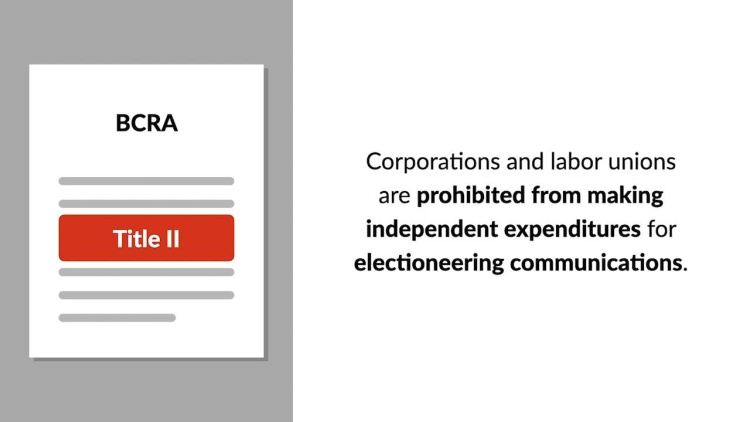McConnell v. Federal Election Commission
United States Supreme Court
540 U.S. 93 (2003)
- Written by Megan Petersen, JD
Facts
In 2002, Congress passed the Bipartisan Campaign Reform Act (BCRA) to respond to concerns about campaign finance reform. Titles I and II of the act imposed new restrictions on the use of soft money by candidates and on “electioneering communications.” Title II also imposed limits on political parties' ability to make unlimited independent expenditures, i.e., expenditures that were not coordinated with the parties' candidates. Titles III and IV of the act restricted candidates’ access to discounted airtime based on the type of their advertisements and prohibited individuals under 17 years of age from making contributions to political parties. Title V of the act required broadcasters to keep and make available records of requests for political advertisements. Senator Mitch McConnell (plaintiff) brought an action against the Federal Election Commission (FEC) (defendant), asserting that BCRA was unconstitutional under the First Amendment. A three-judge panel of the district court ruled parts of the statute constitutional and other parts unconstitutional. The United States Supreme Court granted review.
Rule of Law
Issue
Holding and Reasoning (Stevens and O’Connor, JJ. for BCRA Titles I and II; Rehnquist, C.J. for BCRA Titles III and IV; Breyer, J., for BCRA Title V)
Concurrence/Dissent (Scalia, J.)
Concurrence/Dissent (Thomas, J.)
Concurrence/Dissent (Kennedy, J.)
Dissent (Rehnquist, C.J.)
What to do next…
Here's why 904,000 law students have relied on our case briefs:
- Written by law professors and practitioners, not other law students. 47,100 briefs, keyed to 995 casebooks. Top-notch customer support.
- The right amount of information, includes the facts, issues, rule of law, holding and reasoning, and any concurrences and dissents.
- Access in your classes, works on your mobile and tablet. Massive library of related video lessons and high quality multiple-choice questions.
- Easy to use, uniform format for every case brief. Written in plain English, not in legalese. Our briefs summarize and simplify; they don’t just repeat the court’s language.







